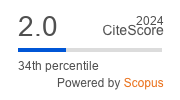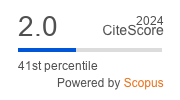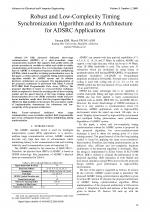| 3/2009 - 8 |
Robust and Low-Complexity Timing Synchronization Algorithm and its Architecture for ADSRC ApplicationsKIM, J. |
| Extra paper information in |
| Click to see author's profile in |
| Download PDF |
Author keywords
advanced dedicated short range communication, cross-correlation method, field programmable gate array, orthogonal frequency division multiplexing, timing synchronization
References keywords
ofdm(9), synchronization(6), timing(5), communications(5), electronics(4)
Blue keywords are present in both the references section and the paper title.
About this article
Date of Publication: 2009-10-26
Volume 9, Issue 3, Year 2009, On page(s): 39 - 44
ISSN: 1582-7445, e-ISSN: 1844-7600
Digital Object Identifier: 10.4316/AECE.2009.03008
Web of Science Accession Number: 000271872000008
SCOPUS ID: 77954752385
Abstract
5.9 GHz advanced dedicated short range communications (ADSRC) is a short-to-medium range communication standard that supports both public safety and private operations in roadside-to-vehicle and vehicle-to-vehicle communication environments. The core technology of physical layer in ADSRC is orthogonal frequency division multiplexing (OFDM), which is sensitive to timing synchronization error. In this paper, a robust and low-complexity timing synchronization algorithm suitable for ADSRC system and its efficient hardware architecture are proposed. The implementation of the proposed architecture is performed with Xilinx Vertex-II XC2V1000 Field Programmable Gate Array (FPGA). The proposed algorithm is based on cross-correlation technique, which is employed to detect the starting point of short training symbol and the guard interval of the long training symbol. Synchronization error rate (SER) evaluation results and post-layout simulation results show that the proposed algorithm is efficient in high-mobility environments. The post-layout results of implementation demonstrate the robustness and low-complexity of the proposed architecture. |
| References | | | Cited By «-- Click to see who has cited this paper |
| [1] http://www.leearmstrong.com/DSRC Home/Standards Programs/North American/DSRC_Tutorial_06-10-021/sld091.htm
[2] L. Hanzo, M. Munster, B.J Choi and T. Keller, "OFDM and MC-CDMA for Broadband Multi-User Communications", WLANs and Broadcasting, Wiley, 2003 [PermaLink] [3] Shinsuke Hara, Ramjee Prasad, "Muticarrier Technologies for 4G Mobile Communications", Artech, 2003 [4] Joint Technical Committee on Wireless Access, "Technical Report on RF channel characterization and System Deployment Modeling", Paper No. JTC(AIR) 1994.09.23-065R6, Sep. 23, 1994 [5] T. M. Schmidl and D. C. Cox, "Robust frequency and timing synchronization for OFDM", IEEE Transaction on Communications, vol. 45, pp.1613-1621, Dec. 1997 [CrossRef] [Web of Science Times Cited 2309] [SCOPUS Times Cited 3142] [6] J.J. van de Beek, M. Sandell, "ML Estimation of Time and Frequency Offset in OFDM Systems", IEEE Transactions on Signal Processing, vol.45, pp.1800-1805, July 1997 [CrossRef] [Web of Science Times Cited 1496] [SCOPUS Times Cited 2018] [7] S. Chang and B. Kelley, "Time synchronization for OFDM-based WLAN systems", IEEE Electronics Letters, vol. 39, pp. 1024-1026, June 2003 [8] N. Chan, M Tanaka and R.Heaton, "OFDM Timing Synchronization under Multi-path Channels", VTC-2003 Spring, vol. 1, pp. 378-382, May 2003 [9] Feng Lu, Takm Ohseki, Hiroyasu Ishikawa and Hideyuki Shinonaga, "On Symbol Timing for OFDM based Mobile Communications Systems", Global Telecommunications Conference, vol. 1, pp. 273-277, Nov. 2002 [10] Kun-Wah Yip, Yik-Chung Wu and Tung-Sang Ng, "Timing-synchronization analysis for IEEE 802.11a wireless LANs in frequency-nonselective Rician fading environments", IEEE transactions on Wirelss Communications, vol. 3, pp. 387-394, March 2004 [CrossRef] [Web of Science Times Cited 28] [SCOPUS Times Cited 34] [11] C. Williams, M.A. Beach and S. McLaughlin, Robust "OFDM timing synchronization", IEEE Electronics Letters, vol. 41, pp. 751-752, June 2005 [12] K.Wang, J. Singh and M. Faulkner, "FPGA implementation of OFDM-WLAN synchronizer", Electronics Design, Test and Applications, 2004 EEE Electronics Letters, pp. 89-94, Jan 2004 [CrossRef] [SCOPUS Times Cited 14] [13] Yin-Tsung Hwang, Kuo-Wei Liao and Chien-Hsin Wu, "FPGA realization of an OFDM frame synchronization design for dispersive channels", ISCAS'03, vol. 2, pp. 256-259, May 2003 [CrossRef] Web of Science® Citations for all references: 3,833 TCR SCOPUS® Citations for all references: 5,208 TCR Web of Science® Average Citations per reference: 274 ACR SCOPUS® Average Citations per reference: 372 ACR TCR = Total Citations for References / ACR = Average Citations per Reference We introduced in 2010 - for the first time in scientific publishing, the term "References Weight", as a quantitative indication of the quality ... Read more Citations for references updated on 2025-06-05 01:00 in 40 seconds. Note1: Web of Science® is a registered trademark of Clarivate Analytics. Note2: SCOPUS® is a registered trademark of Elsevier B.V. Disclaimer: All queries to the respective databases were made by using the DOI record of every reference (where available). Due to technical problems beyond our control, the information is not always accurate. Please use the CrossRef link to visit the respective publisher site. |
Faculty of Electrical Engineering and Computer Science
Stefan cel Mare University of Suceava, Romania
All rights reserved: Advances in Electrical and Computer Engineering is a registered trademark of the Stefan cel Mare University of Suceava. No part of this publication may be reproduced, stored in a retrieval system, photocopied, recorded or archived, without the written permission from the Editor. When authors submit their papers for publication, they agree that the copyright for their article be transferred to the Faculty of Electrical Engineering and Computer Science, Stefan cel Mare University of Suceava, Romania, if and only if the articles are accepted for publication. The copyright covers the exclusive rights to reproduce and distribute the article, including reprints and translations.
Permission for other use: The copyright owner's consent does not extend to copying for general distribution, for promotion, for creating new works, or for resale. Specific written permission must be obtained from the Editor for such copying. Direct linking to files hosted on this website is strictly prohibited.
Disclaimer: Whilst every effort is made by the publishers and editorial board to see that no inaccurate or misleading data, opinions or statements appear in this journal, they wish to make it clear that all information and opinions formulated in the articles, as well as linguistic accuracy, are the sole responsibility of the author.



